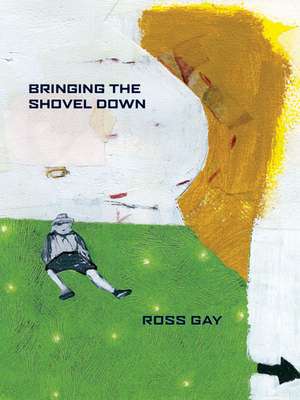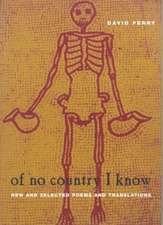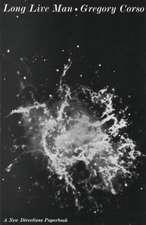Bringing the Shovel Down: Pitt Poetry Series
Autor Ross Gayen Limba Engleză Paperback – 23 ian 2011
Bringing
the
Shovel
Downis
a
re-imagination
of
the
violent
mythologies
of
state
and
power.
Din seria Pitt Poetry Series
-
 Preț: 102.92 lei
Preț: 102.92 lei -
 Preț: 102.10 lei
Preț: 102.10 lei -
 Preț: 102.10 lei
Preț: 102.10 lei -
 Preț: 101.06 lei
Preț: 101.06 lei -
 Preț: 93.19 lei
Preț: 93.19 lei -
 Preț: 101.28 lei
Preț: 101.28 lei -
 Preț: 137.55 lei
Preț: 137.55 lei -
 Preț: 101.86 lei
Preț: 101.86 lei -
 Preț: 100.00 lei
Preț: 100.00 lei -
 Preț: 102.92 lei
Preț: 102.92 lei -
 Preț: 101.28 lei
Preț: 101.28 lei -
 Preț: 101.86 lei
Preț: 101.86 lei -
 Preț: 101.06 lei
Preț: 101.06 lei -
 Preț: 101.06 lei
Preț: 101.06 lei -
 Preț: 101.86 lei
Preț: 101.86 lei -
 Preț: 103.09 lei
Preț: 103.09 lei -
 Preț: 105.19 lei
Preț: 105.19 lei -
 Preț: 101.86 lei
Preț: 101.86 lei -
 Preț: 112.40 lei
Preț: 112.40 lei -
 Preț: 102.27 lei
Preț: 102.27 lei -
 Preț: 101.06 lei
Preț: 101.06 lei -
 Preț: 101.69 lei
Preț: 101.69 lei -
 Preț: 103.33 lei
Preț: 103.33 lei -
 Preț: 138.61 lei
Preț: 138.61 lei -
 Preț: 101.06 lei
Preț: 101.06 lei -
 Preț: 101.86 lei
Preț: 101.86 lei -
 Preț: 102.10 lei
Preț: 102.10 lei -
 Preț: 101.28 lei
Preț: 101.28 lei -
 Preț: 140.01 lei
Preț: 140.01 lei -
 Preț: 102.51 lei
Preț: 102.51 lei -
 Preț: 103.09 lei
Preț: 103.09 lei -
 Preț: 90.75 lei
Preț: 90.75 lei -
 Preț: 100.65 lei
Preț: 100.65 lei -
 Preț: 100.24 lei
Preț: 100.24 lei -
 Preț: 122.71 lei
Preț: 122.71 lei -
 Preț: 101.28 lei
Preț: 101.28 lei -
 Preț: 103.33 lei
Preț: 103.33 lei -
 Preț: 106.01 lei
Preț: 106.01 lei -
 Preț: 101.06 lei
Preț: 101.06 lei -
 Preț: 102.27 lei
Preț: 102.27 lei -
 Preț: 91.79 lei
Preț: 91.79 lei -
 Preț: 135.69 lei
Preț: 135.69 lei -
 Preț: 91.79 lei
Preț: 91.79 lei -
 Preț: 101.28 lei
Preț: 101.28 lei -
 Preț: 100.24 lei
Preț: 100.24 lei -
 Preț: 104.15 lei
Preț: 104.15 lei -
 Preț: 101.86 lei
Preț: 101.86 lei -
 Preț: 100.65 lei
Preț: 100.65 lei -
 Preț: 100.41 lei
Preț: 100.41 lei -
 Preț: 99.83 lei
Preț: 99.83 lei
Preț: 90.75 lei
Nou
Puncte Express: 136
Preț estimativ în valută:
17.36€ • 18.13$ • 14.37£
17.36€ • 18.13$ • 14.37£
Carte disponibilă
Livrare economică 15-29 martie
Preluare comenzi: 021 569.72.76
Specificații
ISBN-13: 9780822961352
ISBN-10: 0822961350
Pagini: 80
Dimensiuni: 152 x 203 x 8 mm
Greutate: 0.12 kg
Ediția:1
Editura: University of Pittsburgh Press
Colecția University of Pittsburgh Press
Seria Pitt Poetry Series
ISBN-10: 0822961350
Pagini: 80
Dimensiuni: 152 x 203 x 8 mm
Greutate: 0.12 kg
Ediția:1
Editura: University of Pittsburgh Press
Colecția University of Pittsburgh Press
Seria Pitt Poetry Series
Recenzii
“Gay’s
language
and
imagery
are
exquisite.”
—Synecdoche
—Synecdoche
“These poems speak out of a global consciousness as well as an individual wisdom that is bright with pity, terror, and rage, and which asks the reader to realize that she is not alone—that the grief he carries is not just his own. Gay is a poet of conscience, who echoes Tomas Tranströmer's ‘We do not surrender. But want peace.’”
—Jean Valentine
—Jean Valentine
“Ross Gay is some kind of brilliant latter-day troubadour whose poetry is shaped not only by yearning but also play and scrutiny, melancholy and intensity. I might be shocked by the bold, persistent love throughout Bringing the Shovel Down if I wasn’t so wooed and transformed by it.”
—Terrance Hayes
—Terrance Hayes
“With masterful rhythms and multiple tones, Ross Gay gets down to bare-bones difficulty: love often tinged with grief, violence, and deception. He moves from macrocosm to microcosm, probing injustice’s absurdities as well as a pining self that can’t be pinned down. As with his ‘little dreamer, little hard hat, little heartbeat,’ Gay’s poems are vitalized by the poet’s ache for compassion and truth.”
—Ira Sadoff
—Ira Sadoff
“Artfully honest. Gay’s poems are ‘small lanterns’ of ‘lighting’ and more.“
—Philadelphia Inquirer
—Philadelphia Inquirer
“With language wholly his own, sparkling clean and tender, ‘Bringing the Shovel Down’ exposes a dark marriage of love and violence from which one cannot turn away.”
—ForeWord Magazine
—ForeWord Magazine
“Blending classic craft with contemporary subject matter, poet Ross Gay’s new collection packs a wallop in its urgency to communication the joys and sorows of life."
—Pittsburgh Post-Gazette
—Pittsburgh Post-Gazette
Notă biografică
Ross Gay is assistant professor of English at Indiana University and author of the poetry collection Against Which. His poems have appeared in American Poetry Review, Gulf Coast, Margie: The American Journal of Poetry, Ploughshares, and Sou’wester, among other publications. Gay also teaches in the low-residency MFA program at Drew University and is a Cave Canem fellow.
Descriere
Bringing the Shovel Down maps the long and arduous process of being inculcated with the mythologies of state and power, the ramifications of that inculcation (largely, the loss of our humanity in the service of maintaining those mythologies), and finally, what it might mean, what it might provide us, if we were to transform those myths. The book, finally, has one underlying question: How might we better love one another?
















